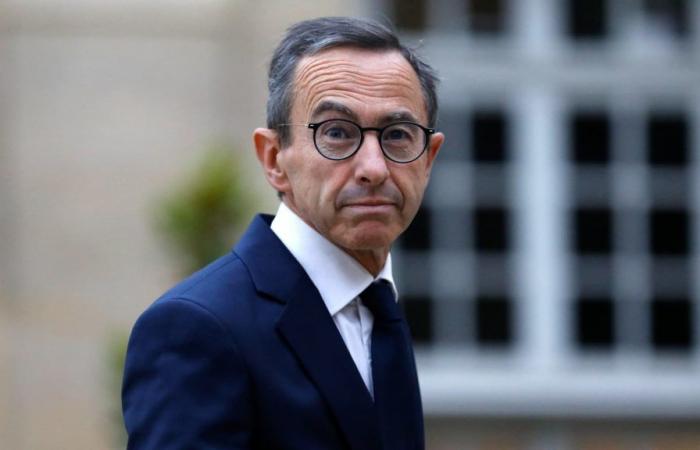
The Minister of the Interior put forward several measures this Wednesday, October 2, before deputies to more easily expel people without a residence permit. Bruno Retailleau wants to increase the number of flights to countries of return and is trying to put pressure on them, by drawing on the side of Gérald Darmanin and Nicolas Sarkozy.
Almost 36 hours after Michel Barnier’s general policy declaration, the fight against illegal immigration is taking shape. His Minister of the Interior Bruno Retailleau unveiled his action plan to deputies on Wednesday. Starting with the use of “grouped flights” in Mayotte.
Asked about the situation on the island during the first government news questions, the tenant of Place Beauvau indicated that he had asked the prefect to organize “grouped flights” to return nationals of the Democratic Republic of Congo (DRC) , present illegally, in their country of origin.
“Grouped flights” like Sarkozy’s “charter flights”
“At least three flights are planned for the month of October alone to partially empty the administrative detention center” in Mayotte, those around him then clarified. The maneuver aims to facilitate expulsions in the territory which sees the arrival each year of migrants from the African Great Lakes region, mainly from the DRC, transiting through the Comoros.
The migration situation ignited the situation last year with the blocking of the main roads on the island by groups demanding the expulsion of undocumented immigrants.
“Group flights” are not a new thing. Nicolas Sarkozy, then Minister of the Interior, himself deployed weekly “charter flights” to repatriate people without residence permits in 2003, notably to Afghanistan, Senegal and the Ivory Coast.
Possible return of the crime of illegal residence
The tenant of Place Beauvau clarified the contours of this system this Thursday morning on RTL. Our policy “consists of saying that those who have arrived irregularly in mainland France or overseas are not intended to stay with us,” asserted Bruno Retailleau.
“When we violate our borders, it must be an offense,” the Minister of the Interior further clarified, seeming to open the door to the reestablishment of the offense of illegal stay.
Raised by François Hollande in 2012, this legislative measure established the principle that any person present illegally in France could be fined, without prison time.
Retained by the government in the immigration law after an addition by senators, the provision had been censored by the Constitutional Council and therefore no longer currently exists in law.
The measure was part of the National Rally program during the last legislative elections and was recalled to the podium by Marine Le Pen on Tuesday. The president of the RN deputies has already called on Michel Barnier to work on a future immigration law at the risk of otherwise censoring him.
Multiply consular passes
Beyond this question, Bruno Retailleau wants to focus on consultative passes, this document issued by the country of origin of the person subject to an OQTF (obligation to leave French territory) and without which France cannot expel him.
“There is no question of taking off planes from a starting point without being certain that upon their arrival there will be acceptance from the local authorities,” assured Bruno Retailleau.
A challenge therefore when certain countries are issuing consular passes sparsely. Enough to push Bruno Retailleau to hope for “bilateral agreements so that the countries of origin and the countries of transit accept that nationals are sent back to them”.
Problem: these agreements signed between two nations are often for a specific duration. It is often necessary to wait for these agreements to expire before renegotiating them.
“Reciprocity” between visas and expulsions
The Minister of the Interior, clearly aware of the situation, therefore calls for “a dialogue” with the countries refusing the return of their nationals. The exchanges could, however, take on the appearance of a standoff: Bruno Retailleau thus called for “reciprocity” between countries.
Concretely, this would mean that France would continue to grant visas to nationals of certain countries only if the latter agree in exchange to issue consular passes.
With an example in mind: Algeria. “We issue 200,000 visas and we have a little less than 2,000 consular passes in return,” noted the Minister of the Interior.
If the example can be debated, the country benefiting from a bilateral agreement which facilitates family reunification and access to certain professions, the observation is the same for Morocco. In September 2021, out of 3,301 OQTFs issued to Moroccan nationals, only 80 expulsions had taken place, according to Gabriel Attal, then government spokesperson.
This figure is partly explained by the current health crisis, with Morocco requiring a negative PCR test to issue the consular pass, but which cannot alone explain the finding.
A method close to that of Darmanin
Gérald Darmanin, then Minister of the Interior, therefore decided to suspend half the French visas issued to Moroccans and Algerians in the fall of 2021. With some success: a year later, he announced a return to normaljudging that the issuance of consular passes had returned to its 2019 level.
Bruno Retailleau will therefore adopt the method of his predecessor and also intends to activate other levers. For example, he wants to “condition development aid” to countries granting consular passes. However, development aid has already fallen by 11% in 2023 without any clear change in flows.
Finally, Bruno Retailleau still calls for playing on “customs tariffs” on a European scale for recalcitrant countries. The measure seems difficult to apply: customs tariff agreements are made at the level of the European Commission and are the same for all EU members.





